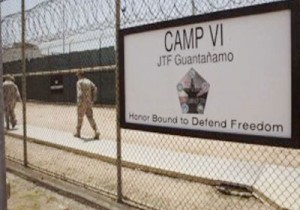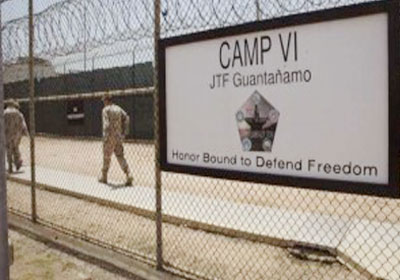Item 4 General Debate
HRC 23
5 June 2013
Thank you Mr. president,
The United States continues to detain individuals for indefinite periods without charge or trial at Guantanamo Bay in Cuba and at Bagram Airbase in Afghanistan in violation of its obligations under international human rights law.
Of the 779 prisoners once detained at Guantanamo, 166 remain. Of those, the US designated 86 in 2010 as eligible for transfer to their home or third countries. But transfers have stalled due to a combination of congressional and executive restrictions. In recent months, more than 100 prisoners have engaged in a hunger strike, reportedly out of desperation because of their prolonged indefinite detention. The US military stated as of June 1 that it is force-feeding 37 of them. The force-feeding of competent hunger-striking prisoners violates international legal protections against cruel, inhuman and degrading treatment, and contravenes medical ethics standards.

الصورة من الشروق
In a speech on May 23, 2013, US President Barack Obama renewed a pledge he made when he first took office to close the prison facility at Guantanamo. He announced that he was lifting his administration’ ban on transfers of detainees to Yemen and urged Congress to lift ongoing restrictions on detainee transfers. He said senior envoys in the Departments of State and Defense would be appointed to oversee the transfer process. Obama’s announcement is a useful step, but it remains to be seen how it will be implemented.
President Obama also addressed the situation of 46 detainees who were designated by a US inter-agency task force as “too dangerous” to release but who could not be tried – in some cases, he said, because the evidence against them had been compromised or was inadmissible in court. While Obama said he was confident this “legacy problem” could be resolved consistent with the rule of law, he provided no indication that the 46 men would not be detained indefinitely. Another 33 prisoners are slated for prosecution, but only 6 of those face any formal charges.
The United States also continues to use fundamentally flawed military commissions at Guantanamo, which fall far short of international fair trial standards, to prosecute terrorism suspects even though US federal courts also have jurisdiction. The commissions allow the use of evidence obtained by coercion, lack independence, and provide little meaningful access to the proceedings for the public. They also fail to protect attorney-client communications. In February it was uncovered that a government agency had installed listening devices disguised as smoke detectors in attorney-client meeting rooms. In April, pre-trial hearings were delayed because the defense attorneys’ computer system was compromised. In his speech, President Obama signaled a plan to move the military commissions to the US. While doing so might address some logistical concerns, it would not change their fundamental unfairness.
In Afghanistan, the United States has turned over control of significant portions of its detention facility at Bagram to the Afghan government, but several dozen prisoners, including some held for years, remain in US custody. The US has repeatedly asserted that these individuals can be held without charge or trial until the “end of the armed conflict” with al Qaeda. This formulation ignores the end of the inter-state armed conflict in Afghanistan in 2002 and the current applicability of Afghan criminal law to those apprehended in Afghanistan’s non-international armed conflict, as well as individuals apprehended outside Afghanistan in law enforcement situations. These persons should be charged with cognizable criminal offenses and fairly prosecuted, or released.
Indefinite detention without charge at Guantanamo and Bagram and unfair military commission trials are a blight on the human rights record of the United States. We urge the US government to bring an end to these illegal practices by either prosecuting these detainees in civilian courts or releasing them safely home or to third countries.
Thank you Mr. president,
Statement delivered on behalf of:
1. Human Rights Watch
2. Centro de Estudios Legales y Sociales (CELS)
3. Conectas Direitos Humanos
4. CIVICUS: World Alliance for Citizen Participation
5. East and Horn of Africa Human Rights Defenders Project
6. Asian Forum for Human Rights and Development (FORUM-ASIA)
7. International Service for Human Rights
8. International Commission of Jurists
With the support of:
9. African Democracy Forum
10. African Centre for Democracy and Human Rights Studies
11. Think Centre, Singapore
12. Task Force Detainees Philippines (TFDP), Philippines
13. Philippine Alliance of Human Rights Advocates (PAHRA), Philippines
14. Taiwan Association for Human Rights, Taiwan
15. Judicial System Monitoring Programme (JSMP), Timor Leste
16. INFORM Information Documentation Centre, Sri Lanka
17. People’s Watch, India
18. People’s Solidarity for Participatory Democracy (PSPD), South Korea
19. Indonesia Legal Aid Foundation (YLBHI), Indonesia; IMPARSIAL, Indonesia
20. Human Rights Working Group, Indonesia; People’s Vigilance Committee on Human Rights (PVCHR), India
21. Law and Society Trust (LST), Sri Lanka
22. Informal Sector Service Centre (INSEC), Nepal
23. Banglar Manabadhikar Suraksha Mancha (MASUM), India
24. Community Self Reliance Centre (CSRC), Nepal
25. KontraS, Indonesia
26. Pilipina Legal Resource Centre (PLRC), Philippines
27. Centre for Human Rights and Development (CHRD), Mongolia; Function 8, Singapore
28. Singapore Anti-Death Penalty Campaign (SADPC), Singapore; Project X, Singapore
29. Alliance National Timor Leste International Tribunal (ANTI), Timor Leste
30. Programme Against Custodial Torture and Impunity (PACTI), India
Share this Post

